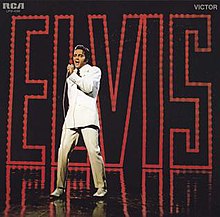
Elvis Presley is the debut studio album by American rock and roll singer Elvis Presley. It was released by RCA Victor, on March 23, 1956,. The recording sessions took place on January 10 and January 11 at the RCA Victor Studios in Nashville, Tennessee, and on January 30 and January 31 at the RCA Victor studios in New York. Additional material originated from sessions at Sun Studio in Memphis, Tennessee, on July 5, August 19 and September 10, 1954, and on July 11, 1955.

Live a Little, Love a Little is a 1968 American musical comedy film starring Elvis Presley. It was directed by Norman Taurog, who had directed several previous Presley films. This was to be Taurog's final film, as he went blind shortly after production ended. Presley shares the screen with fellow legendary singing idol Rudy Vallee, whose career dated to the 1920s, but Vallee, in his late 60s, did not sing in the film.

Singer Presents ... Elvis, commonly referred to as the '68 Comeback Special, is an Elvis Presley concert special that aired on NBC on December 3, 1968. It marked Presley's return to live performance after a seven-year period during which he focused on his film appearances.

Elvis in Concert is the live album released by RCA Records in October 1977 in conjunction with the television special of the same name which featured some of the final performances of American singer and musician Elvis Presley. Videotaped and recorded in June 1977, both the special and album were broadcast and released on October 3, six weeks after Presley's death. The album peaked at No. 5 on the Billboard chart in late 1977. It was certified Gold and Platinum on October 14 and 3× Platinum on August 1, 2002, by the RIAA.

Elvis Now is the sixteenth studio album by American singer Elvis Presley, released in February 1972. The album entered Billboard on February 12, and reached No. 43. The only single from the album, "Until It's Time for You to Go" / "We Can Make the Morning" reached number 9 on the Easy Listening chart in the US in March 1972 and number 5 on the UK Singles Chart in April 1972. The album was certified Gold on March 27, 1992, by the RIAA. "Sylvia" became a hit for Presley in Brazil in the 1970s.
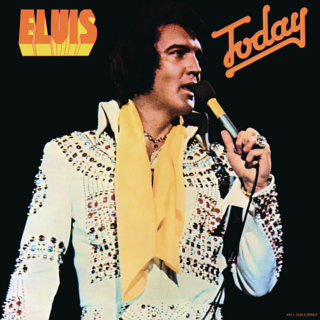
Today is the twenty-second studio album by American singer Elvis Presley, released on May 7, 1975 by RCA Records. The album featured the country and pop music sound typical of Elvis during the 1970s, as well as a new rock and roll song, "T-R-O-U-B-L-E", which was released as its first single and went Top 40 in the US. "Bringing It Back" was its second single in the US. The album also features covers of songs by Perry Como, Tom Jones, The Pointer Sisters, Billy Swan, Faye Adams, The Statler Brothers and Charlie Rich.

Elvis is the second studio album by American rock and roll singer Elvis Presley, released by RCA Victor on October 19, 1956 in mono. Recording sessions took place on September 1, September 2, and September 3 at Radio Recorders in Hollywood, with one track left over from the sessions for Presley's debut album at the RCA Victor recording studios on January 30 in New York. It spent four weeks at #1 on the Billboard Top Pop Albums chart that year, making Presley the first recording artist to have both albums go straight to number one in the same year. It would go on to spend 5 weeks at #1 in total. It was certified Gold on February 17, 1960, and Platinum on August 10, 2011, by the Recording Industry Association of America.
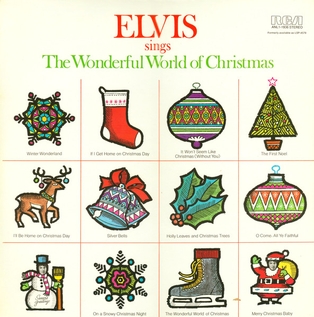
Elvis Sings The Wonderful World of Christmas is the fifteenth studio album by American singer Elvis Presley, released in October 1971. It was his first Christmas album with new recordings since Elvis' Christmas Album (1957). The album's single, "Merry Christmas Baby" / "O Come All Ye Faithful", was later released in November 1971. This album was a top seller and topped the Christmas LP's chart; it would have charted high on the Billboard Top LPs chart, but from 1963 to 1973, holiday albums were not allowed to chart. Though lacking the commercial appeal of Elvis' first Christmas album, it gradually become a perennial favorite. The album was certified Gold on November 4, 1977, Platinum on December 1, 1977, 2× Platinum on May 20, 1988, and 3× Platinum on July 15, 1999, by the RIAA.
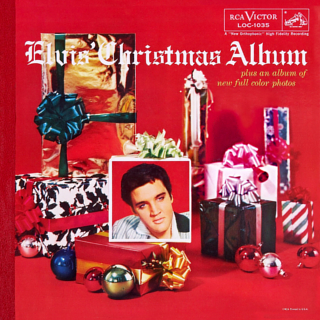
Elvis' Christmas Album is the third studio album and first Christmas album by American singer and musician Elvis Presley on RCA Victor, LOC -1035, a deluxe limited edition, released October 15, 1957, and recorded at Radio Recorders in Hollywood. It has been reissued in numerous different formats since its first release. It spent four weeks at No. 1 on the Billboard Top Pop Albums chart, and was the first of two Christmas-themed albums Presley would record, the other being Elvis Sings the Wonderful World of Christmas, released in 1971. The publication Music Vendor listed Elvis' Christmas Album on their singles charts for two weeks in December 1957 – January 1958, with a peak position of No. 49.
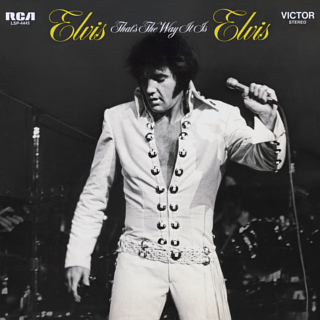
That's the Way It Is is the twelfth studio album by American singer and musician Elvis Presley, released on RCA Records, LSP 4445, in November 1970. It consists of eight studio tracks recorded at RCA Studio B in Nashville, and four live in-concert tracks recorded at The International Hotel in Las Vegas. It accompanied the theatrical release of the documentary film Elvis: That's the Way It Is, although it is not generally considered a soundtrack album. The album peaked at number 21 on the Billboard 200 and at number eight on the country chart. It was certified Gold on June 28, 1973, by the Recording Industry Association of America and up-graded to Platinum, for sales of a million copies on March 8, 2018.

Singer Presents Elvis Singing Flaming Star and Others is a compilation album by American singer and musician Elvis Presley, released by RCA Records on October 1, 1968. It spent five months available only at select retail stores featuring products by the Singer Sewing Machine Company as a promotional tie-in with Presley's upcoming Christmas television special on the NBC network, which Singer had sponsored. It was reissued for normal retail channels as Elvis Sings Flaming Star in April 1969, becoming the first Elvis Presley budget album on the RCA Camden label, catalogue CAS 2304. The 1969 release peaked at number 96 on the Billboard 200 album chart. It was certified Gold on July 15, 1999, and Platinum on January 6, 2004, by the Recording Industry Association of America.

Double Trouble is the fifteenth soundtrack album by American singer and musician Elvis Presley, released by RCA Victor in mono and stereo, LPM/LSP 3787, in June 1967. It is the soundtrack to the 1967 film of the same name starring Presley. Recording sessions took place at Radio Recorders and at Metro-Goldwyn-Mayer studios in Hollywood, California, on June 28, 29, and 30, 1966. It peaked at number 47 on the Billboard 200.

Christmas Duets is a 2008 album released by RCA Records, consisting of archival Elvis Presley vocal recordings mixed with completely re-recorded instrumentation and new vocals by contemporary country and gospel singers. Three tracks on the album do not have duet vocals: "The First Noel", "If I Get Home On Christmas Day", and "Winter Wonderland". However, the instrumental tracks for these songs were re-recorded by contemporary musicians, just like on all other songs. Martina McBride and Carrie Underwood duets have both charted on the Billboard country charts, with the former reaching the Top 40.

Peace in the Valley is an EP by American singer and musician Elvis Presley, released in April 1957 on RCA Victor Records in mono with catalogue number EPA 4054. It reached number three on the short-lived Billboard EP chart, number three on the album chart and number 39 on the singles chart.

Fun in Acapulco is the seventh soundtrack album by American singer and musician Elvis Presley, released on RCA Victor Records in mono and stereo, LPM/LSP 2756, in November 1963. It is the soundtrack to the 1963 film of the same name starring Presley. Recording sessions took place at Radio Recorders in Hollywood on January 22 and 23 and February 27, 1963; and at RCA Studio B in Nashville, Tennessee, on May 26 and 28, 1963. It peaked at number three on the Billboard Top Pop Albums chart.

Speedway is the seventeenth soundtrack album by American singer and musician Elvis Presley, released by RCA Victor in mono and stereo, LPM/LSP 3989, on June 25, 1968. It serves as the soundtrack album for the 1968 film Speedway starring Presley. Recording sessions took place at Metro-Goldwyn-Mayer studios in Hollywood, California, on June 20 and 21, 1967. It peaked at number 82 on the Billboard 200.
"When It Rains, It Really Pours" is a song originally written and recorded by Billy "The Kid" Emerson. His version, titled "When It Rains It Pours", was released by Sun Records in 1954. The song was later recorded by Elvis Presley in 1957, but not released until 1965 on the album Elvis for Everyone.

The albums discography of Elvis Presley began in 1956 with the release of his debut album, Elvis Presley.
Joseph Anthony Tunzi is an American author, publisher, and producer, based in Chicago, Illinois. He has been described as "a renowned author from Chicago" and "one of the foremost authorities on Elvis Presley," authoring, self-publishing, and producing over 60 titles about Presley, amongst others, for over three decades. Tunzi's other projects focus on topics including Frank Sinatra, The Beatles, Muhammad Ali, Martin Luther King Jr., the Assassination of John F. Kennedy, and the Vietnam War.
